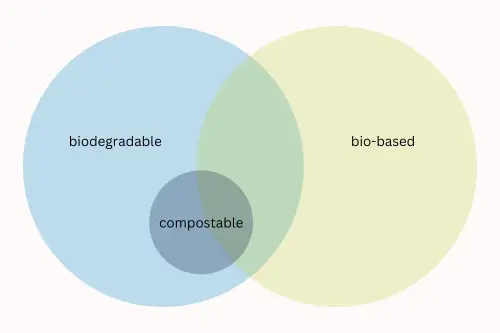
Biodegradable, Bio-based, and Compostable: A Breakdown
There are several terms related to eco-friendly and sustainable materials that are often used interchangeably but have distinct definitions. Understanding the differences between terms like biodegradable, bio-based, and compostable is important for making informed choices as a consumer and supporting green initiatives.
Biodegradable
A material that is biodegradable has the ability to break down, decompose, and return to nature over time with the help of living organisms like bacteria and fungi. Most things are biodegradable, but the rate at which they decompose is based on the environment. Research indicates that consumers find the term biodegradable to be misleading because it doesn’t specify a timeframe or environment. To reduce consumer confusion, California, Maryland, Minnesota and Washington, have made it illegal to use the term “biodegradable” in marketing claims related to plastic products and bags.
Bio-based
Bio-based refers to products that are made from- raw materials such as plants and other renewable agricultural, marine, and forestry materials. Bio-based only refers to where the material comes from, natural resources rather than fossil fuels. It has no bearing on end-of-life. Not all bio-based materials are biodegradable.
Compostable
Compostable material meets specific standards that require it to fully biodegrade in a commercial composting facility. Materials break down completely into natural components and will not release harmful residue or toxins. They will breakdown within a designated timeframe, resulting in usable compost that is returned to the soil. Products labeled as compostable must be tested to meet US industrial composting standards. All compostable items are biodegradable, but not all biodegradable items are compostable.
Checking labels, looking for verification logos, and researching materials is the best way to determine if a product is made for disposal through compost, recycling, or landfill. Understanding the terminology provides crucial information to make eco-conscious decisions as consumers.
What We Do
Display Pack partners with brands in both the consumer packaged goods and food service industries to provide thermoformed custom and stock packaging to meet high standards and create the optimal end-user experience. Display Pack provides speed-to-market with their stock packaging portfolio, as well as the ability for custom development tailored to each brand’s unique specifications. Learn more about Display Pack’s custom packaging capabilities and commitment to sustainability.
